December 2020: Olive Tree

Volume V/Issue 9/December 2020


From The Editorial Desk
Three Wise Men And A Grinch
After Jesus was born in Bethlehem in Judea, during the time of King Herod, Magi from the east came to Jerusalem and asked, “Where is he that is born king of the Jews?” (Matthew 2:1-2)
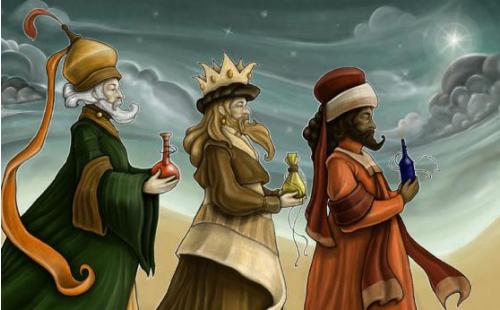
Surely one of the great stories of Christmas is the story of the visit of the Wise Men from the East. Wherever the story of the birth of Jesus is told, so too is told this delightful tale of strange men from some faraway land who brought gifts to the baby Jesus.
From time immemorial every children’s Christmas pageant has included them–Joseph, Mary and Jesus in the middle, shepherds on the left, Wise Men on the right. Always three nervous little boys bringing gold and two others gifts they can’t pronounce.
All that we know about the Wise Men we find in chapter 2. They show up in verse 1 and disappear in verse 12.
Over the centuries, the Wise Men were given names–Caspar, Melchior and Balthasar. They were venerated as saints and a tradition arose called the Adoration of the Magi. In fact, if you go to the Cathedral in Cologne, Germany, you will find relics that are said to be the remains of the Wise Men.
It all begins this way:
After Jesus was born in Bethlehem in Judea, during the time of King Herod, Magi from the east came to Jerusalem and asked, “Where is he that is born king of the Jews?” (Matthew 2:1-2)
Right away we discover something interesting. The Wise Men show up in Jerusalem after the birth of Jesus. That runs contrary to the notion that the shepherds and the Wise Men arrive in Bethlehem at the same time. The shepherds were there the night Jesus was born. The Wise Men came sometime later. It may have been a few months later. Some think even a year or so later. It was at least a few days later because when the Wise Men find Jesus he is with his mother in a house in Bethlehem, not in a manger.
That, by the way, fits well with the tradition of the Eastern Orthodox Church that the Wise Men came 12 days after Christmas–on January 6. And that’s why it is called Epiphany in the Church Year. Epiphany celebrates the manifestation of Christ to the Gentiles.
As a further note, that’s where the 12 Days of Christmas comes from. Traditionally, the 12 days of gift-giving lead you from his birth on December 25 to the arrival of the Wise Men on January 6.
Notice that these Wise Men are called “Magi from the east.” The term “Magi” is ultimately a Persian word that referred to a special class of priests in the Persian empire.
We know from other sources that the Magi had existed for hundreds of years before the time of Christ. They had their own religion, their own priesthood, their own writings. It appears from the book of Daniel that they existed in his day and it even seems that Daniel was appointed head over the cast of the Magi in the time of King Darius.
The Magi were the professors and philosophers of their day. They were brilliant and highly educated scholars who were trained in medicine, history, religion, prophecy and astronomy. They were also trained in what we would call astrology.
In our day astrology has gotten a deservedly bad reputation. But in the beginning astrology was connected with man’s search for God. The ancients studied the skies in order to find the answers to the great questions of life–Who am I? Why am I here? Where am I going?
There is a difference between astronomy and astrology. Astronomy is the science of the study of the stars. Astrology is the belief that there is a connection between the position of the stars and human destiny. The Magi were experts in both astronomy and astrology and claimed to be able to divine the future.
The important fact for us to know is that they were highly influential in Persia. They were in fact advisors to the king. While they were not kings, it would not be wrong to call them king-makers because they functioned as political advisors to the Persian rulers.
Finally, they were highly-educated men who thought deeply about life and consequently it is perfectly legitimate to call them “Wise Men.”
But why have they traveled so far from home? It was a journey of a thousand miles from Persia to Israel. Why have they made such a treacherous journey?
The answer is, they have come to see the baby born king of the Jews. This is fascinating. They knew a baby had been born but they didn’t know where. They knew he was a king but didn’t know his name.
So they come to Jerusalem–the capital city–seeking help. They also assume that everyone must know about this baby. But a great surprise awaits them.
Verse 2 adds a detail that has baffled and intrigued Bible scholars and astronomers for 2,000 years: “We have seen his star in the east, and are come to adore him.”
What was “his star in the east?” What did they see and how did they know it was his star and how did they connect it with Israel?
It helps to remember that the Wise Men were students of the sky. That means they would not be frightened or put off by anything unusual that suddenly appeared to them. It also helps to know that in those days it was not uncommon to associate the birth of a great ruler with unusual heavenly phenomena. The star would make perfect sense to them and would in fact perfectly fit what they already believed. You might say that if God wanted to get a message to these pagan priests, he picked the perfect way.
But still, what was the star? Frankly, we don’t know. I believe it was a Supernatural Star. One that they had never seen before. This theory suggests that the star was not a natural phenomena at all, but rather was a star placed by God in the atmosphere especially for the Magi to see. Those of us who hold this view, point to the shekinah glory of God in the Old Testament. At certain points in history God revealed himself as a cloud by day or fire by night or even a bright light in order to guide his people. In this context, we might think of the pillar of fire with which God led Israel in the wilderness.
A star alone would not tell the Magi all they needed to know. They knew enough to come to Bethlehem to seek a baby born king of the Jews. They didn’t get that from the skies. So here’s the bigger question: How did they know the star meant anything at all?
We are greatly helped by this fact: We know that the Jews and Persians had intermingled for at least 500 years. It seems that they considered Daniel as one of their own. Since the time of Daniel the Persians had known of the Jewish expectation of a Messiah. It is possible that they even knew from the prophecy of the “70 weeks” in Daniel 9, which gives the approximate time of the Messiahs appearing. What they did not know was the exact time. When they saw the star, they knew the time had come.
The reaction of Herod is fascinating. Matthew 2:3 says that “And king Herod hearing this, was troubled, and all Jerusalem with him.” The word “troubled” really means to “shake violently.” You could say that like Elvis, Herod was all shook up.
We do know that he is very old and very sick. He is a dying man tottering on an unstable throne. The idea of a baby “born” king of the Jews was a direct threat to him.
He’s scared, too, because the Magi are also potential threats to him. We don’t know whether there were only three or not, but even if there were, they certainly didn’t travel alone.
Most of our pictures of the Magi show three guys riding three camels across the deserts. Nothing could be farther from reality. There is no way the Magi traveled 1,000 miles across the desert by themselves. In those days, the only way you could travel in the desert was in a large caravan.
The Magi would have swept into Jerusalem with pomp and circumstance and covered with the dust of a thousand miles. At a minimum they would have brought with them a full military escort along with their servants. The total party could have amounted to more than 300 men. No wonder all of Jerusalem was buzzing.
By the way, it’s interesting that the Magi had no trouble gaining an audience with Herod. That fact attests to their importance.
So Herod turns to the scribes and priests for advice. He has only one question: Where is this child to be born? The scribes don’t have to look it up. They already know the answer. 700 years earlier the prophet Micah had predicted the Messiah’s birth in Bethlehem. That was common knowledge in Israel. Little children learned that in Sabbath School before they were six years old. It’s hard to believe that Herod didn’t know it.
If you add what the scribes knew to what the Wise Men figured out, you surely conclude that the signs of Jesus’ coming were clear enough for anyone to see.
It is sometimes said that God always speaks loud enough for a willing ear to hear. The Wise Men knew and did something; the scribes knew and did nothing.
Herod now does something we might think strange. He calls in the Magi and asks them when the star first appeared to them. The text (verse 7) indicates he wanted an exact time. He didn’t tell them why he wanted to know and you have to read on in the story to find out the answer:
When Herod realized he had been outwitted by the Magi, he was furious, and gave orders to kill all the boys in Bethlehem and its vicinity who were two years old and under, in accordance with the time he learned from the Magi.
It appears that the Magi told Herod that the star first appeared to them two years earlier. Does that suggest that Jesus had been born two years earlier? Or did the star appear two years earlier to give them plenty of time to make the journey? Perhaps it took them two years to make the journey from Persia. It seems likely that Herod assumed that the star first appeared when the child was born. If the Magi told him it had first appeared two years ago, then that explains why Herod ordered all the male children in Bethlehem under two years old put to death. Now we can’t be exactly sure about that … but neither could Herod.
We all know what happens next. Herod asks the Magi to go to Bethlehem as his representatives, find out where the baby is, and report back to him so he can go and worship him. Herod is up to no good, and for all their wisdom the Magi fall for his trick. But why shouldn’t they? If they have come so far to worship the child, why wouldn’t Herod do as much? They have no reason to suspect his motives.
At this point, something unusual happens. As the Magi set out for Bethlehem, which was only six miles south of Jerusalem, the star they saw in the east suddenly reappears. I think they first saw it in the east, set out on the their own for Jerusalem, and didn’t see it again until they left for Bethlehem.
Verse 9 is very specific. It says the star went on before them until it came and stood over the very home where the baby Jesus was. That’s necessary because, although they know the child is in Bethlehem, they don’t know where in Bethlehem, so the star leads them to the right house.
That does not sound like any natural star. It sounds like a miraculous star created by God to lead the Magi to a particular house. No wonder they rejoiced with exceedingly great joy. The end of their long, hard journey was at hand.
Verse 11 tells us that “And entering into the house, they found the child with Mary his mother, and falling down they adored him”.
You may ask the question: When the Magi finally found the baby Jesus, were they disappointed? They might have been. After all they been through, after such a long journey, after the detour in Jerusalem, did what they find seem anti-climatic? It might have seemed that way to the average person. But to the Magi, he was a King.
Jesus possessed more royalty in a cradle than Herod possessed in his fine palace. He was greater in his infancy than Louis 14th in his eminency. He was more powerful as a child than Napoleon as an emperor.
But as said, to the normal eye, it did not seem that way. The eyes of flesh revealed nothing but a normal baby, gurgling and cooing, moving his tiny hands side to side, reaching eagerly for his mother’s breast.
Somehow the Magi saw beyond the present and into the future and in deep faith, they worshipped him. They saw that this child would one day rule the world and they were not ashamed to fall on their faces before him.
When they found this tiny baby, not yet two weeks old, rocking in his mother’s arms, these great men fell on their faces before him. To this baby they gave the honor due a king. What Herod craved, the baby received.
Now we come to the last detail, the one for which the Magi are most remembered: Then they opened their treasures and presented him with gifts of gold, frankincense and myrrh. (vs 11) The gifts in themselves are expensive and represent a worthy tribute. But beyond that, there is a very ancient tradition that sees these gifts as symbolic of who this child would become.
The early church fathers said that gold represented the wealth and power of a king. Frankincense was used in the temple worship of the Lord. It represents his deity–He is truly God born in human flesh. Then there is myrrh–a kind of perfume made from the leaves of the cistus rose. It was used in beauty treatments, but when mixed with vinegar it became an anesthetic. After a person died, myrrh was used to anoint the body and prepare it for burial. John 19:39 tells us that Jesus’ body was bound in linen wrappings along with 75 pounds of myrrh and aloes. So the gift of myrrh pictures his suffering and death.
You ask, did the Magi understand all this? No, not at all. But God arranged it so that their gifts to the Holy Child would point us to who he is and why he came.
Lastly let me offer three abiding truths from this story for your consideration.
1. If the Wise Men can find Jesus, then so can you.
Think of how many barriers they had to cross to get to Jesus. There was a culture barrier, a distance barrier, a language barrier, a racial barrier, a religious barrier, not to speak of a hostile king and indifferent religious leaders. It wasn’t easy for them to find Jesus, but they did. If they found him, then so can you.
2. If God can use a star to reach these pagan astrologers, then he can use anything to reach anybody.
Sometimes we despair of seeing our friends come to Christ because nothing we say seems to have the slightest effect on them. This story ought to give us great hope. Our God is infinitely creative in the things he can use to break through to people who seem to be so far from him. He can use a star, a book, a tract, a television show, a song, a bow and arrow, a chance comment, or anything he desires. If God can reach the Wise Men, he can reach anybody.
3. If the Wise Men offered Jesus gifts fit for a king, then so should we.
It’s good to remember that the tradition of giving gifts at Christmastime did not start with Santa Claus. It started with the Wise Men. Often we get so caught up in giving and receiving that we forget where it all began.
It is good to give gifts to each other; it is even better to give gifts to Jesus. It is good to show our love to those we love; it is even better to show love to the One who loved us when we were unlovely.
This, surely, is the central meaning of the story. This year and every year, and all during the year, we are invited to return to Bethlehem. A baby lies there who is our King and our God and our Sacrifice. The King in the cradle. The Deity in diapers. The Sacrifice resting in his mother’s arms

How to Obtain Purity of Thought

Philippians 4:8: For the rest, brethren, whatsoever things are true, whatsoever modest, whatsoever just, whatsoever holy, whatsoever lovely, whatsoever of good fame, if there be any virtue, if any praise of discipline, think on these things.
Saint Augustine says: "To regulate the motions of the soul is the office of interior mortification." Sin begins in the heart, soul and mind. Interior mortification is aimed at rooting out sin from the deepest recesses of our interior, where it begins and takes root. Our goal is totally pure thought. Now purity of thought extends far beyond the sixth Commandment to all of our thinking. Consider that the sins against the Eighth Commandment begin in our minds. Yes, detraction, calumny and gossip all come from our minds and vomit out of our mouths. "But the things which proceed out of the mouth, come forth from the heart, and those things defile a man." (Matthew 15:18) Indeed much that flows from our mouths and today from our keyboards defiles us, so we must change this by purifying our hearts and changing our way of thinking.
Let us begin on working on purifying our minds in order to practice interior mortification. To do this Saint Alphonsus says: "And above all, it is necessary to impress deeply on the mind certain fundamental spiritual maxims, such as: “God alone deserves to be loved. Sin is the only evil which we ought to hate. Whatever God wills is good. All worldly goods shall have an end. The most insignificant action, performed for God’s sake, is more profitable than the conversion of the whole world, effected from any other motive than the love of God. It is necessary to do what at the hour of death we would wish to have done. We ought to live on this earth as if there were nothing in existence but God and ourselves.” He whose mind is continually filled with holy maxims suffers little molestation from earthly objects, and is always strong enough to resist his corrupt inclinations. The Saints kept their souls always occupied with the truths of eternity, and thus in the time of temptation, were almost insensible to the goods or the evils of this life." Over the next several months we will take each of these fundamental spiritual maxims to heart.
Let us begin by considering just how impure our minds actually are. Let us go over the list of fundamental spiritual maxims Saint Alphonsus sets before our minds:
God alone deserves to be loved.
Sin is the only evil which we ought to hate.
Whatever God wills is good.
All worldly goods shall have an end.
The most insignificant action, performed for God’s sake, is more profitable than the conversion of the whole world, effected from any other motive than the love of God.
It is necessary to do what at the hour of death we would wish to have done.
We ought to live on this earth as if there were nothing in existence but God and ourselves.
Have we taken issue with any of these maxims? Do we want to find some way to minimize any of these? If so, our mind is impure. In the world it is easy to adopt wrong thinking. In fact, we should consider that we have adopted wrong thinking and need to come to the fountain of truth in order to wash wrong thinking away. The world has always been a cesspool, but today it is far worse. We do not need to take time to prove this, we should already know this to be true. Instead our time must be spent in the fountain of truth washing away all wrong thinking.
What would you do, if you were pushed into a cesspool? You would get out and take a shower, possibly several. In fact, I have a friend, who fell into a 'honey pot' in Korea, which is what they call a cesspool. He had to take five showers to get clean! We will also spend much time in eternal truth in order to rid ourselves of all wrong thinking we have absorbed from the world around us. The Scriptures must be our constant companion, then the writings of the Fathers of the Church and of the other Saints.
Over the next several months we will take time to learn these fundamental spiritual maxims and take them to heart. Let us consider first the Great Commandments of love. This first, compiled from Sacred Scripture is this: "Thou shalt love the Lord thy God with thy whole heart, thy whole soul, thy whole mind, thy whole understanding and all of thy strength." We are to surrender everything to Almighty God without reserve. Notice the word whole, which appears in Scripture. Also notice the word all. Whole and all, indicate everything. We hold absolutely nothing back for ourselves, but surrender all into God's hands.
The second commandment of charity is to love our neighbor for the love of God. The Fathers of the Church tell us that if we do not love our neighbor, then we do not truly love God. If we truly love God, then we will love our neighbor. Jesus tells us: "But I say to you, Love your enemies: do good to them that hate you: and pray for them that persecute and calumniate you: That you may be the children of your Father who is in heaven, who maketh his sun to rise upon the good, and bad, and raineth upon the just and the unjust." (Matthew 5:44-45) Let us remember that our enemies are also our neighbors.
Saint Paul asks the Galatians (4:16): "Am I then become your enemy, because I tell you the truth?" Truth has an ugly daughter, hatred. There are two possible reactions to truth, acceptance and hatred. And sometimes standing for and telling the truth brings out this ugly daughter, hatred. We should remember Scripture: "A time to keep silence, and a time to speak." (Ecclesiastes 3:7) There are many times we should remain silent, and then there are times that our duty requires us to speak. Let us think well on this, for today many have the habit of speaking, when they should keep silence. Instead of speaking, let our way of life be a silent sermon about how to live by the Gospels. And this is why we need to purify our mind. Wrong thinking leads to wrong actions.
We recommend you take the list of things Saint Alphonsus recommends you think about and write them down and begin thinking about these fundamental spiritual maxims. It is by these spiritual maxims we should live. They will be the beginning of purifying our mind and heart.

Everyone Who Asks, Receives
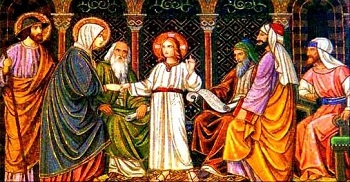
St. Luke tells us that the Holy Family had traveled to Jerusalem for the feast of the Passover. Again, St. Luke sets the story for us when he writes they had already left Jerusalem to return home but discovered that the Child Jesus was not in their company as they traveled. Those of you who are parents can appreciate what St. Joseph and Our Lady were going through as they were searching for the Child Jesus. Really, any of us who are frantically searching for something that we need can understand to a certain extent, I am sure, their efforts in searching for Jesus. All of us search for what we need. We search for important letters. We search for contact information. We search for tools that we need in completing work around the house. We search for recipes that we need. The list goes on and on. We all search for what we need. Quite frankly, this is what the holy season of Advent reminds us. It reminds God's people to look for . . . to search for . . . the Coming of Our Blessed Saviour. Advent reminds us of a two-fold search, if you will: 1) we anticipate when God first sent His Son into the world as a small innocent Baby born in Bethlehem; 2) It reminds us to look for Our Blessed Lord coming again in all His glory. We should anticipate and look forward to Our Lord coming again with great joy. People search for things that bring them joy and satisfaction. Don't we do this each and every December? We go out Christmas shopping in order to buy gifts for our loved ones that will bring them joy and satisfaction. Or we fill out our Christmas wish list hoping that Santa Claus will bring us everything we hoped for. Human beings so often place their trust in worldly, material possessions which they hope will make them happy and bring them contentment. Quite frankly, this is why many people have abuse problems with drugs and alcohol because they are looking for ways to make themselves happy and feel happy. In this material world in which we are a part, material things that we expect to bring us joy only bring us joy that is temporary.

Conceived without Original Sin
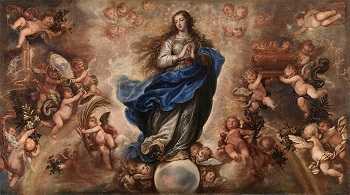
December 8 is so special in the Church Calendar since it is the feast of the Immaculate conception. Originally, this feast was celebrated in the Eastern Church as conception of Mary by St. Anne as early as 7th century. In 1708, Pope Clement XI in his Papal Bull,"Commissi Nobis" established this feast for the entire Church.
Pope Pius IX made it a dogma of the Church by Papal Bull "Ineffabilis Deus" (1854).
However don't you know that St. Thomas Aquinas at first did not consider this Immaculate conception? Inasmuch as if Mary was conceived immaculately by St. Anne, Mary did not sin at all and therefore do not need a Savior ?
Duns Scotus, a Franciscan Theologian, held that Mary was saved also by our Lord Jesus Christ through "preventive redemption;" that is Mary was like vaccinated prior to her birth so as to be worthy mother of Jesus Christ. With this, Jesus Christ was able to save her mother from stain of sin.
In the Holy Scripture, St. Gabriel greeted Mary, "Hail, full of grace," Kekaritomene in Greek which means that Mary was highly favored person by God. Mary was indeed in state of union with God.
From the considerations foregoing, we might not be born by our parents without Original Sin unlike Mary, but we can become like her in fighting against sinfulness. We can manifest thru our lives our sincere repentance. Nowadays, there's indeed a great temptation to commit sin yet with the help of God's grace, we can overcome all things through Christ who strengthens us.

The Funny Pharmacy
A joyful mind maketh age flourishing: a sorrowful spirit drieth up the bones. - Proverbs 17:22


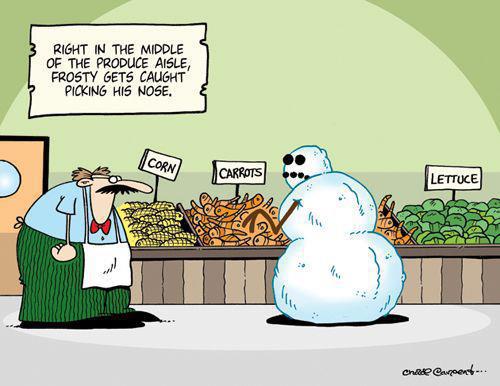
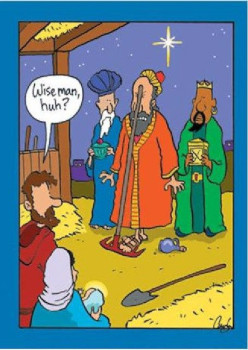


Frequently Asked Questions

Can God Ever Change His Mind?
Christians have long affirmed that God is unchangeable. In recent years, however, advocates of a theory called open theism have argued that God can and does change and that we can cause that change. They find their support for this in passages such as Genesis 18, where Abraham intercedes before the Lord for Sodom and Gomorrah, and God seemingly changes His mind. They claim further support from passages like , Jeremiah 18:7–10 Jonah 3:10, and Genesis 6:6, which speak of God repenting or relenting or being sorry.
The Flood: Was God Sorry for Making Man?
For example, at the time of the global Flood, Genesis 6:5–7 tells us that God was “sorry” that He had made man on the earth:
And God seeing that the wickedness of men was great on the earth, and that all the thought of their heart was bent upon evil at all times, It repented him that he had made man on the earth. And being touched inwardly with sorrow of heart, He said: I will destroy man, whom I have created, from the face of the earth, from man even to beasts, from the creeping thing even to the fowls of the air, for it repenteth me that I have made them.
The fact that God repented-changed His mind- that He had made mankind does not mean that He thinks His decision to create them was a mistake. Rather, the focus of God’s sorrow is the wickedness of mankind who not only bears His image, but was once without sin in His very good creation (Genesis 1:31; cf. Ecclesiastes 7:29). Though post-Fall, the intent of man’s heart was only evil continually, God’s heart is grieved because of this.
The Fall: Was God Taken By Surprise?
Not only do open theists argue that God changes His mind, but they also argue that He does not have exhaustive foreknowledge of future events. Naturally, for open theists, passages that seem to suggest that God “finds out” something are often cited to defend this point of view. In Genesis 3:11, for instance, it seems that God is unaware of what Adam has done. Does this mean God did not know that Adam would disobey His command (Genesis 2:17) or that He had to come up with a plan of salvation once Adam had disobeyed Him?
The question God asks Adam in Genesis 3:11, however, is not based on His ignorance but is rhetorical in nature:
These are not questions [Genesis 3:9, 11] of a Deity who has been taken by surprise. It is not as if he were ignorant of the events that have occurred. In fact, the interrogative of the second question has a special use here. Sometimes it is employed in Hebrew not of a question, but rather to express the conviction that the contents of the statement are well known to the hearer. Thus the question has a rhetorical aspect: God is saying, “Surely you have eaten of the tree .” And the purpose for such a statement is in order to elicit a confession from the man that he is culpable and in need of forgiveness.
God’s announcement of a Savior in Genesis 3:15 was not just an afterthought in the plan of God. We should consider the fact that God foreknew that the Fall would happen, as the Bible tells us that He chose to redeem humanity through the death of His Son before the foundation of the world (Ephesians 1:3–6, 3:11; 1 Peter 1:18–20; Revelation 13:8).
Interpretive Principles to Consider
These passages that talk about God changing His mind look and read (and are intended to be read) as though God is changing His mind. So if these passages claim that God changes His mind, isn’t it then wrong for Christians to claim that God is unchangeable?
If these passages claim that God changes His mind, isn’t it then wrong for Christians to claim that God is unchangeable?
There are several points to consider. Firstly, when Christians describe God as unchanging, this is to say that He is unchanging in His being and character. What is not meant is that He is static or paralyzed. He is not like the king or queen of the United Kingdom who reigns but does not rule. The God of Scripture is constantly acting. That God is unchangeable should not be misconstrued as meaning that He cannot and does not act.
Secondly, while the above texts talk of God as changing, there are numerous texts in the Old and New Testaments that tell us that God does not change in His being (Psalm 102:25–27; c.f. Hebrews 1:10–12; Malachi 3:6; James. 1:17) and that He does not change His mind (Numbers 23:19; Hebrews 6:17–18). This is not to play different texts against each other but to know that we need some interpretive principles to help us understand the Bible. There are two reasonable interpretive principles that can help us understand these passages:
-
Difficult passages should be interpreted in light of other clearer passages.
-
Passages which are found in the historical narrative in Scripture should be interpreted in light of the didactic (instruction/teaching) passages (such as the epistles.).
-
Jesus established a Church that would have the final authority to speak for him whenever there was a matter of dispute among the people of God. Which would include interpreting the scriptures. (I Timothy 3:15)
Lastly, we also must understand that the Bible uses human ways to speak about God, the technical term for which is anthropomorphism. Anthropomorphic language represents God’s unchanging attributes in the changing circumstances and different moral conditions of His creatures. Passages such as Genesis 6:6 need to be taken into consideration with Numbers 23:19. In doing so, we will understand that from our human viewpoint God seems to change His mind about people, but He is only represented to us that way that we might relate to our omniscient God.
When the Bible uses human language to describe God, particularly in the narrative sections of Scripture, the didactic portions of the Scripture give us the corrective explanation.
Again and again the Bible describes God in human terms. Why? Because they are the only terms we have to communicate with. For example, the Bible speaks of the “arm of God” (Deuteronomy 5:15) with respect to His power while Psalm 50:10 says, “[God] owns the cattle on a thousand hills.” We know, however, that this is metaphorical language. The Bible isn’t trying to tell us that God is a cosmic cowboy who is in the cattle business. That God owns the cattle on a thousand hills is a human way of describing the vast riches that our Creator possesses. This language is perfectly useful to describe God’s activity among us; but when the Bible uses human language to describe God, particularly in the narrative sections of Scripture, the didactic portions of the Scripture give us the corrective explanation. This is not corrective in the sense of error, but in the sense of qualifying the meaning of the text so that we do not fall into serious error.
Does Prayer Change God’s Mind?
Nevertheless, people often ask whether prayer can change God’s mind. To ask this question is really to answer it. How could a prayer change God’s mind? Well, the best football coaches have game plans for their encounters with other teams. If things aren’t working in the first half, they make changes in the changing room at halftime where they move from plan A to plan B. God, however, doesn’t have a plan B. Do we really think that if we say to God, “Well, I know you’re planning to do this, but have you considered this?” that God is going to change His plans based on the wisdom we provide Him? In our prayers, God is not learning things He didn’t already know.
What is it then that would cause God in these texts to change His mind? Is it that when Abraham (Genesis 18:16–33) came to God, he came to Him with information that God lacked apart from what Abraham told Him? Obviously Abraham didn’t teach God something that He didn’t already know. In fact, God knew that Sodom would have fewer than ten righteous people, whereas Abraham did not. God’s mind doesn’t change because it doesn’t need to change. He knows everything, and He knows the end from the beginning. God has no plan B because there are no deficiencies or flaws in His plan A.
Does prayer change things? Yes. Does God use prayer as a secondary means to bring His work to pass? Yes. Does God not only invite us to pray but command us to? Yes. Does the effective prayer of righteous man accomplish much? Yes. But do these things change God’s mind? No. Why? Because God has never had to change His mind from the foundation of the world (Ephesians 1:11).
Declaring the end from the beginning, and from ancient times things that are not yet done, saying, “My counsel shall stand, and all my will shall be done:” (Isaiah 46:10)
For answers to more frequently asked questions, click here: https://www.vaticaninexile.com/frequently_asked_questions.php
The Pope Speaks: December 2020
We Are Not Communicating

We have written on a few subjects, such as I am not Proud to be a Catholic, because the world is redefining terms. In order to communicate with each other, we must use words and understand them the same way. We must speak the truth and use words that both parties understand.
The first thing we need to do is to tell the truth, because there is a Commandment against lying, the Eighth Commandment. Telling the truth means expressing what we believe in our minds and hearts about something. Anything else is a lie, because we are attempting to deceive.
"And in all seduction of iniquity to them that perish; because they receive not the love of the truth, that they might be saved. Therefore God shall send them the operation of error, to believe lying:" (II Thessalonians 2:10) We should love truth, especially the truths of the Divine and Catholic Faith. We should learn how to express those truths properly and clearly to others.
Notice that if we don't love truth, God will send us the operation of error to believe lying. How many of us have told a 'little white lie'? There is nothing little or white about a lie. A lie is a lie and therefore a sin, and therefore one of the evils in the world. Let us not down play any sin as 'little.'
And so has the operation of error come near us? Let us look at a few common things in every day conversation.
Take the word 'scandal' as an example. When we are shocked at someone's sin, we say we are scandalized, but that is not necessarily true. Scandal means an action that will lead another into sin. We may be shocked that someone committed a certain sin, but also not in any way inclined to commit a sin as a result. Let us rather say, "I am shocked that Father John Doe blasphemed."
In the trailer to the documentary film, Pope Michael, We addressed the issue of what religion We say We are. We do not say We are a Roman Catholic, because the only Vatican Council rejected use of that term at the request of the Bishops from England, because such term endorses the Anglican branch theory. Anglicans at the time said that the Church has three branches, Anglican Catholic, Orthodox and Roman Catholic. We state, that We are a Catholic, then proceed to explain what that truly means.
And this brings up a major break through of the operation of error, Vatican II or Second Vatican Council. This assembly of heretics and soon to be heretics is not Catholic and therefore not a successor to the 1869-1870 Vatican Council, an assembly of Catholic Bishops. Therefore it is not Vatican II, but The Council, which formed the Conciliar Church.
Two incidents from five centuries ago are misnamed by many, although as We were preparing this, We could not find this error in Catholic histories. Five centuries ago Martin Luther posted his 95 theses on the door of the church at Wittenberg, beginning the Protestant Revolt. We could also call this the Protestant Formation. However, to call it the Protestant Reformation is a lie, as you cannot reform what does not yet exist. Protestantism could attempt to reform today, but this appears unlikely. In response to the Protestant Revolt, the Catholic Church began a Reformation through the Council of Trent, because reform in people's lives was sorely needed. Note this was not a reform of doctrine, but Trent did present doctrine clearly and initiated many things in order to reform the Church.
The first was the commission to prepare a catechism for the use of Pastors in instructing their flocks in the Catholic Faith. The result is the Roman Catechism, also known as the Catechism of the Council of Trent. The missal, pontifical and ritual were reformed, so that the essential rites of the Sacraments are preserved and the accidental rites were stripped of anything unbecoming that had slipped in over time. This reformation has come to be called the Counter Reformation, which is also a lie.
In response to the question: "May any translation of the Bible, in the vernacular, be read?", the Catechism of Saint Pius X answers: "We can read those translations of the Bible in the vernacular which have been acknowledged as faithful by the Catholic Church and which have explanations also approved by the Church."
Words change meaning, or so we are told. So we must make sure we are getting our point across. Let us look at two words in the Douay-Rheims Bible, penance and repentance.
Penance among Catholics today has come to mean the "fruits worthy of penance." (Luke 3:8) If one looks back at the Latin Vulgate, the word in Latin is the same for both, penance and repentance. The translators used penance and repentance interchangeably.
Matthew 3:2: "And saying: Do penance: for the kingdom of heaven is at hand." The Explanation in the Douay-Rheims tells us: "'Do penance': Paenitentiam agite. Which word, according to the use of the scriptures and the holy fathers, does not only signify repentance and amendment of life, but also punishing past sins by fasting, and such like penitential exercises." So the word penance means three things, repentance, amendment of life and then penitential exercises, which would naturally come from repentance and amendment of life. This is something to keep in mind, during the holy season of Advent, when we hear these words said.
So let us purify our minds and our speech to express the truth, the whole truth and nothing but the truth. We see how improper speech is now in common use. However, the one's I have mentioned are only a few examples.
Let us be careful that we truly understand what we are reading. We have just seen how many misinterpret a simple word like penance. When we must, let us explain what we mean, when we say something. The person we are trying to communicate with may not understand what the words say.
Words are important and powerful and The Enemy misuses words to sow confusion. As We are preparing article, We find We need to define who We consider to be The Enemy. Saint Paul does it best: "For our wrestling is not against flesh and blood; but against principalities and powers, against the rulers of the world of this darkness, against the spirits of wickedness in the high places." (Ephesians 6:12) Remember that Lucifer is the Father of Lies, and the devils are our real enemies.


Saint Mark the Ascetic
On The Spiritual Law
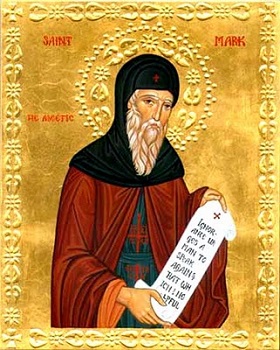
51. Even when nothing is going wrong, be ready for affliction; and since you will have to give an account, do not make extortionate demands.
52. Having sinned secretly, do not try to hide. For 'all things are naked and open to the eyes of Him to whom we have to give an account' (Heb. 4:13).
53. Reveal yourself to the Lord in your mind. 'For man looks at the outward appearance, but the Lord looks at the heart' (I Sam. 16:7).
54. Think nothing and do nothing without a purpose directed to God. For to journey without direction is wasted effort.
55. Because God's justice is inexorable, it is hard to obtain forgiveness for sins committed with complete deliberation.
56. Distress reminds the wise of God, but crushes those who forget Him.
57. Let all involuntary suffering teach you to remember God, and you will not lack occasion for repentance.
58. Forgetfulness as such has no power, but acquires it in proportion to our negligence.
59. Do not say; 'What can I do? I don't want to be forgetful but it happens.' For when you did remember, you cheated over what you owed.
60. Do good when you remember, and what you forget will be revealed to you; and do not surrender your mind to blind forgetfulness.
Saints from East and West
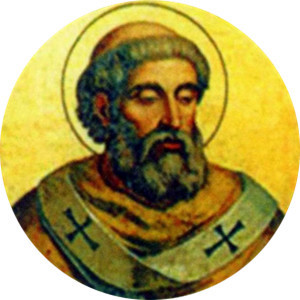
December 10 - Pope Saint Gregory III.
Among the clergy at the funeral of Pope Saint Gregory II, in the year 731, there was a priest of Syrian nationality who was so well known for his holiness, learning, and ability that the people spontaneously carried him off from the procession and elected him by acclamation to the vacant see; he accordingly became pope as Gregory III. He inherited from his predecessor the problem of dealing with the Emperor Leo III the Isaurian, who had begun a campaign against the veneration of holy images, and one of Gregory's first acts was to send a letter of protest. But the bearer, George, a priest, got frightened and returned to Rome without delivering it, to the indignation of the pope, who threatened to degrade him. So George set out again, but was seized by the imperial officers in Sicily and banished. Thereupon Gregory summoned a synod at Rome, wherein bishops, lower clergy and laypeople approved the excommunication of any who should condemn the veneration of images or destroy them. Leo retorted as some of his predecessors had done in similar circumstances: he sent ships to bring Gregory to Constantinople; but they were lost in a storm, so the emperor contented himself with seizing the papal estates in Calabria and Sicily and recognizing the jurisdiction of the patriarch of Constantinople over eastern Illyricum.
After this inauspicious beginning of his pontificate there was a period of peace, during which Saint Gregory rebuilt and decorated a number of churches; in particular he set up a row of pillars before the confessio of Saint Peter, with images of our Lord and the saints thereon and lamps burning around them, a mute but solid protest against Iconoclasm. He sent the pallium to Saint Boniface in Germany, and when the English missionary made his third visit to Rome, in 738, Gregory wrote an appeal to the "Old Saxons." The letter consisted chiefly of quotations from the Bible, which perhaps were not very meaningful to its heathen recipients. It was this pope who sent the English monk Saint Willibald to help Boniface.
Towards the end of Saint Gregory's life the Lombards again threatened Rome. The pope sent a famous appeal for help to Charles Martel and the Franks of the West, rather than to the emperor in the East, but it was long before they could be induced to act. To the bishops of Tuscany Gregory wrote urging them to work for the recovery of four cities captured by the Lombards: if they did not, "I myself, ill as I am, will make the journey, and save you from the responsibility of being unfaithful to your duty." Then, on October 22, 741, Charles Martel died, and a few weeks later, on December 10, Saint Gregory III followed him to the grave. "He was," says the Liber Pontificalis, "a man of deep humility and true wisdom. He had a good knowledge of the Sacred Scriptures and their meaning, and knew the psalms by heart. He was a polished and successful preacher, skilled in both Latin and Greek, and a stout upholder of the Catholic faith; a lover of poverty and the poor, a protector of the widowed and the orphaned, a friend to monks and nuns."
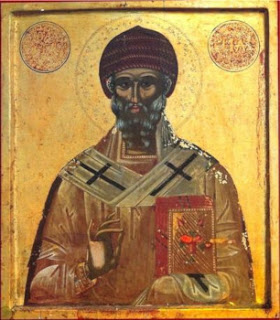
December 12 - Saint Spiridon.
Sainted Spyridon of Trimyphunteia was born towards the end of the third century on the island of Cyprus. The accounts have preserved little about his life. But it is known, that he was a shepherd, and had a wife and children. He used all his substance for the needs of his neighbours and the homeless, for which the Lord rewarded him with a gift of wonderworking: he healed the incurably sick and cast out devils. After the death of his wife, during the reign of Constantine the Great (306-337), they ordained him bishop of the Cypriot city of Trimyphunteia.
Even with the dignity of bishop the saint did not change his manner of life, combining pastoral service with deeds of charity. According to the witness of Church historians, Saint Spyridon in the year 325 participated in the sessions of the First Ecumenical Council. At the Council, the saint entered into a dispute with a Greek philosopher, who was defending the Arian heresy. The plain direct speaking of Saint Spyridon showed everyone the impotence of human wisdom afront Divine Wisdom: "Listen, philosopher, to what I tell thee: we believe, that the Almighty God from out of nothing did create by His Word and His Spirit both heaven and earth, and all the world both visible and invisible. The Word is the Son of God, Who didst come down upon the earth on account of our sins; he wast born of a Virgin, He lived amongst mankind, and suffered and died for our salvation, and then He arose, having redeemed by His sufferings the Original Sin, and He hath resurrected with Him the human race. We believe that He is One in Essence and Equal-in-Dignity with the Father, and we believe this without any sly rationalisations, since it is impossible to grasp this mystery by human reason." As a result of their discussion, the opponent of Christianity became the saint's zealous defender and later accepted holy Baptism. And after his conversation with Saint Spyridon, turning towards his companions, the philosopher said: "Listen! While the disputation with me was conducted by means of argued proofs, I could set forth to certain proofs other proofs, and by the very art of debate I could refute anything, that others might propose. But when, instead of proofs from reason, there began to issue forth from the mouth of this elder some sort of especial power, and the rational proofs became powerless against it, since it is impossible that man can withstand God. If any of you should come to think as I now indeed do, let him believe in Christ and together with me follow this elder, from whose lips doth speak God Himself."
At the Council, Saint Spyridon displayed a proof in evidence of the Oneness within the Holy Trinity. He took in his hand a brick and he grasped it - for an instant fire emerged from it upwards, water flowed downwards, and there remained clay in the hands of the wonderworker. "There are these three elements, but one tile (brick)," Saint Spyridon said, "suchlike also the Holy Trinity: Three Persons, but One God."
The saint concerned himself about his flock with great love. Through his prayer, drought was replaced by abundant life-producing rains, and otherwise incessant rains were replaced by fair weather. And likewise through his prayer the sick were healed and demons cast out. One time a woman came up to him with a dead child in her arms, imploring the intercession of the saint. He prayed, and the infant was restored to life. The mother, overcome with joy, collapsed lifeless. Through the prayer of the saint of God the mother was restored to life. Another time, hastening to save his friend, falsely-accused and sentenced to death, the saint was hindered on his way by the unanticipated flooding of a watery brook. The saint commanded the freshet: "Halt! For thus biddeth thee the Lord of all the world, that I might cross over and a man be saved, on account of whom be my haste." The will of the saint was fulfilled, and he crossed over happily to the other shore. The judge, apprised of the miracle that had occurred, received Saint Spyridon with esteem and set free his friend.
Similar instances are known from the life of the saint. One time he went into an empty church, he gave orders to light up the lampadas and candles, and then he began the Divine services. Intoning the "Peace be unto all," both he and the deacon heard in reply from above the resounding of "a great multitude of voices, proclaiming: "And with thy spirit." This choir was majestic and more sweetly melodious than any human choir. To each petition of the litanies, the invisible choir sang "Lord, have mercy." Attracted by the church singing wafting forth, the people situated nearby hastened towards it. And as they got closer and closer to the church, the wondrous singing all more and more filled the ears and gladdened their hearts. But when they entered into the church, they saw no one besides the bishop and several church servers, nor did they hear any moreso the church singing, by which they were greatly astonished."
Saint Simeon Metaphrastes, the author of his Life, likened Saint Spyridon to the Patriarch Abraham in his virtue of hospitality. "This also must needs be known, how he received strangers," wrote that insider of the monastic circles, Sozomen, who in his "Church History" offers an amazing example from the life of the saint. One time, at the onset of the Forty-day Great Lent a stranger knocked at his door. Seeing that the traveller was very exhausted, Saint Spyridon said to his daughter: "Wash the feet of this man, that he may recline to dine." But with it being Lent there were none of the necessary provisions, since the saint "partook of food only on set days, and on other days he went without food." His daughter therefore answered, that in the house there was neither bread, nor even flour. Then Saint Spyridon, apologising to his guest, ordered his daughter to roast a salted ham in the food-provisions, and having seated the stranger at table, he began to dine, "urging that man to do likewise. When the latter refused, calling himself a Christian, the saint rejoined: "It be no less proper to refuse this, since the Word of God hath proclaimed: "All is pure to the pure" (Tit. 1: 15)."
Another historical detail, reported by Sozomen, was likewise exceedingly characteristic of the saint: he had the custom to distribute one part of the gathered harvest to the destitute, and another portion to those having need while in debt. For himself personally he did not take a portion, but simply showed the entrance to his supply-room, where each could take as much as was needed, and thereafter make a return in like manner, without controls or accountings.
There is also the tale by Sokrates Scholastikos about how robbers planned to steal the sheep of Saint Spyridon: in the deep of night they broke into the sheepfold, but here by some invisible power they found themselves all tied up. With the onset of morning the saint went to his flock, and seeing the tied-up robbers, he prayed and untied them and for a long while he upbraided them to leave off from their path of iniquity and earn a livelihood by respectable work. "Then, having made them a present of a sheep and sending them off, the saint said kindly: "Be ye not vigilant in vain."
They often likened Saint Spyridon to the Prophet Elias, since it was through his prayer during the times of drought that frequently threatened the island of Cyprus, that rain occurred: "Let us view the Angelic-equal Spyridon the Wonderworker. Formerly did the land suffer exceedingly from want of rain and drought: there was famine and pestilence and a great many of the people were stricken, but through the prayers of the saint there did descend rain from the heavens upon the earth: wherefore the people delivered from woe gratefully do proclaim: Hail, thou in semblance to the great prophet, in that the rain driving off famine and malady in good time is come down."
All the Vitae (Lives) of the saint are striking in the amazing simplicity and powerful wonderworking, granted him by God. Through a word of the saint the dead were awakened, the elements of nature tamed, the idols smashed. At one point at Alexandria, a Council had been convened by the Patriarch in regard to the idols and pagan temples there, and through the prayers of the fathers of the Council all the idols fell down, except one - which was very much revered. It was revealed to the Patriarch in a vision that this idol remained to be shattered by Saint Spyridon of Trimyphunteia. Invited by the Council, the saint set sail on a ship, and at the moment the ship touched shore and the saint stepped out on land, the idol in Alexandria with all its offerings turned to dust, which then was announced to the Patriarch and all the bishops gathered round Saint Spyridon.
Saint Spyridon lived his earthly life in righteousness and sanctity, and in prayer he offered up his soul to the Lord (+ c. 348).
In the history of the Church, Sainted Spyridon is venerated together with Sainted Nicholas, Archbishop of Myra in Lycia. His relics repose on the island of Corfu, in a church named after him (except for the right hand, located in Rome). His memory is celebrated a second time on Cheesefare Saturday.


Books to feed your faith!
Spiritual Maxims
$7.50
"Pere Grou's great theme in the Spiritual Maxims is his insistence on the following of the spirit of Christ as opposed to what he calls the natural spirit, or the spirit of private judgment. Prayer for him is contemplative prayer, or the prayer of the interior way. Not that he despised formal meditation by any means, but he regarded it always as a stepping-stone towards a higher form of prayer, the intimate prayer of the spirit. His great aim and desire was to urge and encourage souls not to be afraid, but to persevere in a wholehearted gift of themselves to God, and in a faithful surrender to the guidance of the Holy Ghost." Translator A Monk Of Parkminster St. Alphonsus writes: “a single bad book will be sufficient to cause the destruction of a monastery.” Pope Pius XII wrote in 1947 at the beatification of Blessed Maria Goretti: “There rises to Our lips the cry of the Saviour: 'Woe to the world because of scandals!' (Matthew 18:7). Woe to those who consciously and deliberately spread corruption-in novels, newspapers, magazines, theaters, films, in a world of immodesty!” We at St. Pius X Press are calling for a crusade of good books. We want to restore 1,000 old Catholic books to the market. We ask for your assistance and prayers. This book is a photographic reprint of the original The original has been inspected and many imperfections in the existing copy have been corrected. At Saint Pius X Press our goal is to remain faithful to the original in both photographic reproductions and in textual reproductions that are reprinted. Photographic reproductions are given a page by page inspection, whereas textual reproductions are proofread to correct any errors in reproduction.
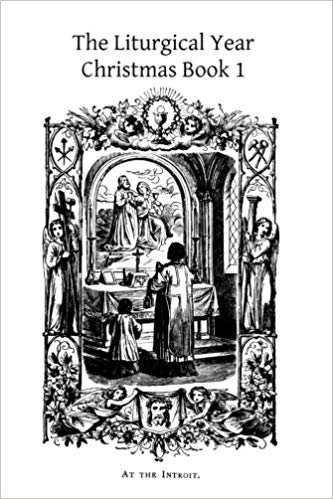
The Liturgical Year: Christmas Book 1 (Volume 1)
$19.95
One of a fifteen volume set, which is being brought back into print for the edification of the Faithful. Anyone who wishes to appreciate the timeless Tridentine Mass and liturgy will find this set a valuable aid in that endeavor. Dom Gueranger has produced a most excellent work, which began the liturgical movement. We pray that this set of books will bring many more to a true appreciation of the Latin Mass and the Divine Office of the Catholic Church. At one time, under the impulse of that Spirit, which animated the admirable Psalmist and the Prophets, she takes the subject of her canticles from the Books of the Old Testament; at another, showing herself to be the daughter and sister of the holy Apostles, she intones the canticles written in the Books of the New Covenant; and finally, remembering that she, too, has had given to her the trumpet and harp, she at times gives way to the Spirit which animates her, and sings her own new canticle. From these three sources comes the divine element which we call the Liturgy. The Prayer of the Church is, therefore, the most pleasing to the ear and heart of God, and therefore the most efficacious of all prayers. Happy, then, is he who prays with the Church, and unites his own petitions with those of this Spouse, who is so dear to her Lord, that he gives her all she asks. It was for this reason that our Blessed Saviour taught us to say our Father, and not my Father; give us, forgive us, deliver us, and not give me, forgive me, deliver me. Hence, we find that, for upwards of a thousand years, the Church, who prays in her temples seven times in the day, and once again during the night, did not pray alone. The people kept her company, and fed themselves with delight on the manna which is hidden under the words and mysteries of the divine Liturgy. Thus initiated into the sacred Cycle of the mysteries of the Christian year, the faithful, attentive to the teachings of the Spirit, came to know the secrets of eternal life ; and, without any further preparation, a Christian was not unfrequently chosen by the Bishops to be a Priest, or even a Bishop, that he might go and pour out on the people the treasures of wisdom and love, which he had drunk in at the very fountain-head. For whilst Prayer said in union with the Church is the light of the understanding, it is the fire of divine love for the heart. The Christian soul neither needs nor wishes to avoid the company of the Church, when she would converse with God, and praise his greatness and his mercy. She knows that the companyof the Spouse of Christ could not be a distraction to her. Is not the soul herself a part of this Church, which is the Spouse? Has not Jesus Christ said: Father, may they be one, as we also are one? and, when many are gathered in his name, does not this same Saviour assure us that he is in the midst of them? The soul, therefore, may converse freely with her God, who tells her that he is so near her; she may sing praise, as David did, in the sight of the Angels, whose eternal prayer blends with the prayer which the Church utters in time.
Jesus and Mary: or Catholic Hymns for Singing and Reading
$14.95
The Author has had a double end in view in the composition of them; first, to furnish some simple and original hymns for singing; secondly, to provide English Catholics with a hymn-book for reading, in the simplest and least involved metres: and both these objects have not unfrequently required considerable sacrifice in a literary point of view. When God raised up our dear and blessed Father St. Philip, St. Ignatius, and St. Theresa, and gave them to His Church, just as the heresy of Protestantism was beginning to devastate the world, those three Saints seem to have had distinct departments assigned to them. All of them, each in a different way, met the subjectivity, the self-introverted habit of mind, which was then coming uppermost, and thus rendered modern Catholicism the great object of our study and the model for our imitation, as being primarily fashioned, and that by the hands of Saints, for the welfare of these latter ages. St. Theresa represents the common sense, the discreet enthusiasm, of devotion and the interior life, which distinguishes Catholic asceticism and the mysticism of the Saints from the fanatical vagaries of the heretics. St. Ignatius, without debarring his children from any field of labour, took in a special way the education of Europe and the evangelization of distant lands for his department, and represented in the Church the principle of faith. St. Philip devised a changeful variety of spiritual exercises and recreations, which gathered round him the art and literature, as well as the piety of Rome, and was eminently qualified to meet the increased appetite for the Word of God, for services in the vernacular, for hymn-singing and prayer-meetings. Sanctity in the world, perfection at home, high attainments in common earthly callings-such was the principal end of his apostolate. He met the gloom and sourness and ungainly stiffness of the puritan element of Protestantism by cheerfulness and playful manners, which he ensured, not in any human way, but by leaving to his children the frequentation of the Sacraments as the chief subject of their preaching and their chief counsel in the spiritual direction of others; and he represented in the Church the principle of love. St. Ignatius was the St. Dominic, St. Philip the St. Francis of his age. What was mediaeval and suited to the mediaeval state of things passed away, and there appeared at the Chiesa Nuova and the Gesu the less poetical, but thoroughly practical element of modern times, the common sense which works and wears so well in this prosaic world of ours. It was natural then that an English son of St. Philip should feel the want of a collection of English Catholic hymns fitted for singing. The few in the Garden of the Soul were all that were at hand, and of course they were not numerous enough to furnish the requisite variety. As to translations, they do not express Saxon thoughts and feelings, and consequently the poor do not seem to take to them. The domestic wants of the Oratory, too, kept alive the feeling that something of the sort was needed; though at the same time the Author's ignorance of music appeared in some measure to disqualify him for the work of supplying the defect. Eleven, however, of the hymns were written, most of them, for particular tunes and on particular occasions, and became very popular with a country congregation. They were afterwards printed for the schools at St. Wilfrid's, and the very numerous applications to the printer for them seemed to show that, in spite of very glaring literary defects, such as careless grammar and slipshod metre, people were anxious to have Catholic. hymns of any sort. The MS. of the present volume was submitted to a musical friend, who replied that certain verses of all or nearly all the hymns would do for singing: and this encouragement has led to the publication of the volume.
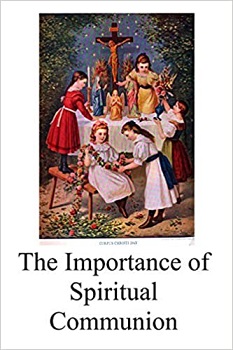
The Importance of Spiritual Communion
Kindle $2.99 / Paperback $5.99
If we cannot receive Holy Communion actually, then let us do so spiritually. These prayers and instructions have been gathered from the Saints and other venerated spiritual writers. Spiritual Communion has been a part of the spiritual life for decades. Growing up I was instructed to make a Spiritual Communion, when I could not go to Communion such as when I assisted at a second Mass. The same is true if one finds oneself at Mass, but not fasting. There are times coming, when it will be difficult, if not impossible to assist at the Holy Sacrifice of the Mass. We should be prepared for such times.
For More Good Traditional Catholic Books:

Alma Mae's Soft Christmas Cookies
The taste of home and holidays
Cook: 8 minutes per batch
Here's Alma Mae's tried and true recipe for soft cut-out Christmas sugar cookies. No store-bought cookie ever did compare to a fresh batch of Alma Mae's cookies; try them, and I'm sure you'll agree! (Alma Mae would always sprinkle the cookies with colored sugar before baking. Alternately, you can also put icing on the cookies after they've cooled.)
Ingredients
3 3/4 cups all-purpose flour
1 teaspoon baking powder
1/2 teaspoon salt
1 cup margarine, softened
1 1/2 cups white sugar
2 eggs
2 teaspoons vanilla extract
Directions
Sift flour, baking powder, and salt together, set aside. In a large bowl, cream together the margarine and sugar until light and fluffy. Beat in the eggs one at a time, then stir in the vanilla. Gradually blend in the sifted ingredients until fully absorbed. Cover dough, and chill for 2 hours.
Preheat oven to 400 degrees F (200 degrees C). Grease cookie sheets. On a clean floured surface, roll out small portions of chilled dough to 1/4 inch thickness. Cut out shapes using cookie cutters.
Bake 6 to 8 minutes in the preheated oven, or until edges are barely brown. Remove from cookie sheets to cool on wire racks.
Sigrid Blencher's Egg Nog Bread

Ingredients
2 eggs, beaten
1 cup eggnog
2 teaspoons rum flavored extract
1 cup white sugar
1 teaspoon vanilla extract
1/2 cup butter, softened
2 1/4 cups all-purpose flour
2 teaspoons baking powder
1/2 teaspoon salt
1/4 teaspoon ground nutmeg
Directions
Preheat oven to 350 degrees F (175 degrees C). Grease bottom only of a 9x5-inch loaf pan, or three 3x5-inch loaf pans.
Blend together the eggs, eggnog, rum extract, sugar, vanilla and butter.
Sift together the flour, baking powder, salt and nutmeg. Add to eggnog mixture and stir just enough to moisten; pour into prepared pan or pans.
Bake large loaf for 40 to 60 minutes, or until a tester inserted in the center comes out clean. Breads baked in the smaller pans require 35 to 40 minutes. Cool for 10 minutes, and remove from pan. Cool completely, wrap tightly in plastic wrap or foil, and store in refrigerator.
Video sermons and instructions: Timeless timely truths for living the Faith
First Sunday of Advent 2014
The Spiritual Life Simplified
Saint Stephen 2010 Sermon
Sacred Moments - A Servant Who Blesses
Sacred Moments: Having Compassion, Making a Difference

Encouragement for Today
Therefore encourage one another and build one another up.... I Thessalonians 5:11
We believe that through our assorted podcasts, Vlogs, audio downloads and devotional blogs, you will find an assorted Treasure Chest of...
- Sermons
- Classic Catholic Audio Books.
- Devotionals
- Scripture Studies
- Catechism Lessons
- Old-Time Christian radio programs
- Catholic Videos
...that will be a help in your faithful walk with the Lord.
LEARN MORE AT THE ENCOURAGEMENT FOR TODAY WEBSITE: https://www.encouragementfortoday.com
Learning in the Womb, Learning from the Womb
Hast thou not poured me out as milk, and curdled me like cheese? Thou hast clothed me with skin and flesh: thou hast put me together with bones and sinews. (Job 10:10-11)

January 22, 1973 marks the disastrous turn in American law that granted women the so‑called right to kill their unborn babies. The Bible makes it abundantly clear that the unborn child is a human being who is known and loved by God as He knits it together in the womb. Science knows that even when it is a single fertilized cell, the unborn child is uniquely human. Now science is learning the truth of what the Bible has told us all along about the individual human nature of the unborn child.
Research is confirming that even before birth children in the womb are learning about the world. The child in the womb does much more than simply hear sounds, including its mother’s voice. The child also becomes familiar with odors in the outside environment.
To test what newborns were thinking, scientists very cleverly hooked up a pacifier to a tape recorder. They then rewarded a particular sucking pattern with various sounds such as mother’s voice. They found that the infants would concentrate on a pattern that would produce their mother’s voice. In another test, women’s voices, and even their father’s voices, were not favored over mother’s heartbeat – a familiar sound in the womb.
Even science is beginning to agree that life in the womb is nothing less than a normal stage of human existence. Like every other stage of life, life in the womb includes learning new things and developing relationships. If only this knowledge was applied to the abortion debate.
Catechism Catch-Up
The Sixth Commandment: Lesson 13

When the 1631 edition of the KJV of the bible was printed it had been found that it had a misprint. Some would call it minor...just one little word accidentally missed by the typesetter. He left out the word ‘not’ in the 6th commandment, reading “Thou shalt commit adultery.” As a result, that edition is now known as ‘The Wicked Bible’...It seems that that version is the version of the Bible that our world today has chosen to claim!
The 6th commandment stands guard over the sanctity and chastity of marriage, and even the preservation of our society. Violation of this command results in broken homes, wrecked lives, disease and death.
Although the commandment is about Adultery, I also am going to include the sin of fornication in our discussion. Traditional dictionary definitions of fornication and adultery generally define fornication as sexual relationships between unmarried people and adultery as a sexual relationship between two people in which at least one of the people involved is married to someone else.
The 6th commandment has never been more dismissed than it is today. No generation has ever been so sex crazed as ours is.
The sexual revolution of the 60s has only snowballed since, and our senses are dulled down so we don’t recognize it so much. It’s an all out assault on the 6th commandment. It is scorned, ridiculed, and belittled. It’s considered outdated and archaic...so old fashioned. We hear so much about ‘consenting adults’ that if we’re not careful we will begin to consent to this evil way and accept it. The church no longer speaks out against it like we should.
Who will take a stand if the Church and its' people don’t? Will the TV shows and movies kicked out by Hollywood, CA? Will porn websites suddenly be shut down? Will advertisers suddenly begin to be responsible for their actions, or will they continue to capitalize on the fact that sex sells? They appeal to mankind’s baser instincts.
Hugh Hefner says we’re just another animal, with instincts and desires that must be satisfied. To him, women are just pets, bunnies, and we’re all just animals! As kids we were taught evolution in the classroom…and now we are acting like it. If you tell a teenager that they are an animal for long enough, he will eventually prove you right!
The common phrase “Everybody’s doing it.”, is being used today to excuse our behavior, but it is no excuse. We were shocked a decade ago where an extensive survey of church teens showed that more than half of them were sexually active, even as they attended their youth groups. Today that number has only increased. Among teen boys something inconceivable has happened by polling standards. You’ve heard of the ‘margin of error’ plus or minus a certain percentage? When asked anonymously if they looked at porn teen boys answered yes at the rate of 98% a margin of error of 2%...meaning that 100% is a possibility. It used to be that they would see this in a magazine or on TV, but they answered that it is on their cell phone...and on the internet! So, if you have 100 kids somewhere between 0 and 4 of them AREN’T looking at porn...and still some parents will say, well, my Johnny is one of those 0-4...I’m just sure of it!
“Everybody’s doing it” is the phrase we hear so often, and it’s pretty close to true, but that does not make it right. Today’s surveys have had to go to the next level. I’ve recently seen anonymous surveys of priest...with over 50% of them admitting they look at porn. And that’s the ones who will admit it! You don’t have to be a very negative person to bow your head and say, yeah, everybody’s doing it...and just give in.
What we need is someone to rise up and say, “Well, I’m not gonna do it!” Indeed, not everyone is living together before marriage. Not every child or teenager is allowed an unsupervised television or computer in their room...many parents are getting smart about that! Many are learning that they can easily monitor this as well as cell phones, and many are realizing the importance of accountability, not only of their children, but of one another. A husband must be accountable to his wife for where he goes and what he does, where he surfs online and what he watches on TV. Does he do this because she doesn’t trust him? No! It’s because he should not trust himself, nor should he put himself in a position of no accountability. Forget about privacy, there’s a wonderful freedom in accountability! We’re supposed to be accountable to God, but today we blow Him off easily and for some reason we fear what our family knows about us more than what God knows!
We are a brainwashed generation.
The movie Titanic is a good example of this. That movie had people believing that you can fall in love in a matter of hours, have sex with them, and then regard them in your heart as the love of your life for the rest of your life. That is silliness. I know some claim love at first sight, but I also hope the young ladies will realize that love at first sight is usually cured by taking a second look!
The good news is from the same youth survey from a decade ago that showed a majority were sexually active, the minority who were not, when asked why not, said it was because of a commitment they had made to Jesus Christ! That tells me that we must do more than just tell them to ‘just say no’...we need to lead them to a meaningful relationship with the Lord, and teach them about commitment by making some commitments ourselves.
Adults, we need to make some changes in our homes and our habits, and then we can ask our kids to.
You can't just roll over on this one and say with the masses, “just be safe.” Or, “If you can’t be good, then be careful!” There is no sex safer than sex within God’s plan!
God’s version of safe sex is abstinence until marriage,
(I Peter 2:11)
"Dearly beloved, I beseech you as strangers and pilgrims, to refrain yourselves from carnal desires which war against the soul..."
A Senator in Washington once said, “today’s teens are just hormone hurricanes, and you can’t stop a hurricane.”
I’m thankful for a power greater than a hurricane, That power is God the Creator of that hurricane, He’s our powerful God!
Some say sex is just a natural God given appetite that we need to fulfill. I’m here to remind you that it is an appetite from which you will not die if it goes unfulfilled! Stop eating and you’ll die. Stop drinking fluids and you’ll die. Stop having sex and you will not die. You may feel like you’re going to, but you won’t.
Your kids are hearing lies about it every day.
(Hebrews 13:4) “Marriage honourable in all, and the bed undefiled. For fornicators and adulterers God will judge.”
Our society has discovered that there are certain penalties attached to sexual immorality. But instead of conforming to God’s plan, they say, let’s see if we can get around the consequences. If there’s a danger of getting a disease, that’s OK, just use protection. And then they have the nerve to say, after all, they’re 95% effective! Imagine 100 of you get on an airplane and the flight attendant says the bad news is we’re going to crash, the good news is that only 5 of you will die!
Today we're saying, if you get pregnant, that’s OK, we can destroy the evidence! No consequences, no problem.
Listen, God’s plan for sex includes one man and one woman, within the marriage relationship.
Lets look at three words:
SEXUALITY / IMMORALITY / PURITY
1. Sexuality
When a man and a woman enter into a marriage contract, the seal of that covenant is their physical union physically. To give away your virginity before marriage is far more serious than you ever thought possible…as you give away the seal to your marriage contract.
Someday you will fall in love for real with someone and marry them, and you will wish with all your heart to give them the most wonderful gift you ever could, your purity, but I remind you today you can only give it away one time!
Married couples: Just as the physical union with in marriage seals the covenant of marriage, so a union outside of your marriage with anyone else is what breaks the covenant.
Any blurring of the sexual distinction is wrong. Girls are wearing guys clothes and guys are decorating themselves up like women.
I sometimes drive around town and have to ask myself, is that a male or female? Is it a Mr. or a Miss.? The girl walks like a man, and the guy is walking like girl!
God made us different for a reason, and any blurring of that difference is wrong.
2. Immorality
We looked earlier at Hebrews 13:4…but lets look at the last part of that verse again. “For fornicators and adulterers God will judge.!”
I Thessalonians 4:3 says “For this is the will of God, your sanctification; that you should abstain from fornication” in other words stay away from premarital sex.
There are dangers of pre-marital and extra-marital sex:
One is having a counterfeit love. Relationships based on sex do not last! You start with the physical and then find out you don’t even like each other. You never grew together intellectually, emotionally, or spiritually! But…if you start the physical after marriage, the other three parts just keep on growing! Then you have more than a sexual partner, you have a best friend who really loves you. Real love is patient, pure, and unselfish.
Another danger of pre-marital and extra-marital sex is that it has emotional consequences. Studies show a direct correlation between pre-marital sex and personal emotion problems…guilt, anxiety and loss of self-respect.
Guilt is the most destructive emotion we can have. It leaves you shattered, uncertain, and unproductive. And you lose that “glow” (it is the only way that I can explain it,) that always accompanies sexual purity.
Ladies, let me tell you how men think… There’s something mysterious about the unknown. There’s something very attractive about the unknown. And often, once you reveal yourself to the guy, once the mystery is gone, so is he. And that won’t feel like just another break-up, it will feel like a divorce.
There are also physical consequences the wages of sin is still death! Drunkards can be in danger of cirrhosis of liver, smokers can get cancer in the lungs, gluttony can cause cardiovascular disease and being sexually impure puts you in danger of diseases with no cures. There are at least 7 diseases besides AIDS which have no cure, and all carry long-term consequences, and all are spread around thru a crowd of people willing to have sex outside of the protection of marriage!
Maybe you say, “he’s only willing to be with me”, or “she’s only willing to be with me.” Don’t be so sure! If they’re willing to do it with you then they’ll do it with others and may already have. When you go to bed with someone, you go to bed with their entire sexual history, and with everyone who THOSE people have been with.
Another danger of pre-marital and extra-marital sex is that it has Marital consequences. There are those who say, “it’s OK for her and me to do this, because we know we’re going to get married.” No, it’s not OK. Why? Because God said it’s not OK…who are you to rewrite the rules? You may find yourself not married to them! Even if you do marry them, you have reduced your chances for a happy marriage because you have chipped away at the foundation of trust. In the back of your mind you will always know that the person you married is capable of immorality. They were willing to sin with you before marriage and they’re capable of sinning against you now that you are married.
Then there’s negative spiritual consequences of having pre-marital and extra-marital sex . But doesn't God forgive? Yes He does! But forgiveness and consequences are two different things.
David sinned with Bathsheba, then committed murder…and in 2 incredible passages of scripture we see an awesome forgiveness that David requested and received--but there were still consequences. God said, “David, you will live in a valley of tears the rest of your life. The sword will not depart from your house.” He buried a baby that died. Then one of his sons raped his daughter. And God said it was direct results of his sin.
We have discussed sexuality. We have discussed immorality. In conclusion I want to talk about purity.
How to stay pure: Protect your mind
The eye-gate and the ear-gate are so important…they are the pathways to the mind. Men need to protect their eyes!
II Peter 2:14 says, that “they have eyes full of adultery, insatiable for sin.” Psalms 101:3 says “I did not set before my eyes any unjust thing:” It would be good to memorize that verse.
Job said, “I made a covenant with my eyes, that I would not so much as think upon a virgin.”
Get away from music whose theme is predominantly lust and sex. Don’t accommodate sin. If you can’t flip around the channels with out looking for something dirty to look at then cut it off! If you can’t be alone together in a car then don’t be. “make not provision for the flesh”
Make a pre-determined decision to stay pure, and that you won’t date anyone who hasn’t made the same commitment.
Maybe you are one who says, “It’s too late for me, I’ve already given it away” There is good news! One day a woman was brought to Jesus, taken in the very act of adultery. She expected to be condemned, but Jesus said, I don’t condemn you, go and sin no more!
You can’t change the past, but your future is spotless! Keep it that way!
READ MORE FROM THE TRADITIONAL CATECHISM AT THE WEBSITE: https://www.traditionalcatechism.com
Living Catholic:
Understanding Emotions. Lesson 1 PT 1
God’s Word is the key God has given to man to understand himself. As we turn to God’s Word in order to understand emotions, we will not find emotions treated as a separate subject. The Bible isn’t written that way. Rather, the Bible shares the unfolding story of God’s work with mankind, and the subject of emotions from God’s perspective is found intertwined throughout the pages of sacred script.
Indeed, one does not have to read far into the Genesis account until he senses the emotion of pleasure and satisfaction on God’s part as He examines His newly formed creation. Seven times in Genesis 1, God looked at what He had done, and calls it good. Likewise, in the story of mankind, one can almost sense the emotion of loneliness that Adam must have experienced after a day of naming the animals and not finding a help meet for him. We certainly identify the negative emotions of shame on the part of Adam and Eve when they heard the voice of God coming to meet them, and Cain’s anger as his sacrifice was rejected.
Emotions are a part of the human story. We all know what it is like to have a full range of feelings. We welcome some emotions such as joy or courage, and avoid others such as fear or guilt.
The dictionary says that emotions are “an affective state of consciousness in which joy, sorrow, fear, hate or the like is experienced, as distinguished from cognitive and volitional states of consciousness.” In more simple terms emotions are feelings in contrast to deliberate thoughts or decisions made by the will.
Each person faces the challenge of managing his emotions. From childhood to old age we have feelings, some times very powerful and seemingly out of control. In fact, at times it may seem that they have control over us.
Questions to ponder:
1.Where will we find God’s viewpoint on emotions?
2. How do our emotions differ from our thoughts?
3. How should the emotions of a grandparent be different from that of a child?
4. Since emotions are defined as not being a part of what we would deliberately choose, is that to mean we have no control over them?
To Learn More Principles For Life Go To: Resources: Principles of Life


Pray for the Holy Father! Pray with the Holy Father!
- Your prayers are asked this month and every month for the intentions of the Holy Father, Pope Michael.
- Pray especially that Holy Ghost inspires and helps us prepare spiritual manuals and days of recollection to make available to all.
- Keep in your prayers our Podcast Ministry, a new way to reach out in the missionary work of the Church! We ask for prayers for our other activities world wide. We have made good contacts in the Philippines and Japan and ask prayers that these contacts will bear much fruit for the salvation of souls.
- Be sure to keep St. Helen Catholic Mission in your prayers. Why not go on over to the site now and see what they have to offer and how you might be able to help!
- Also we ask you to keep in prayer our increasing missionary work in the United States and elsewhere.
- Your prayers are asked for Father Francis Dominic as he continues the work in Kissimmee Florida that has been entrusted to him within the Church.
- Pray for those outside the Church and those who do not know God, that they may see the light of grace and be led safely home to the refuge of the Holy Catholic Church.
- As always, we also ask that you pray for yourself! Never forget your own state of soul. God is calling you to His service in His love. We know that our Lord can count on you to answer.
- We are all praying especially for you, too. May you correspond with every grace of God!
- In what other needs or intentions may we pray for you? Let us know!
- Let us remember that the Church runs on prayer. Without your prayers, God will not work in hearts and souls to bring them to a knowledge of the truth. (I Timothy 2:4)


To Donate online go to:

To Donate by Mail:
Our address is
Vatican in Exile
829 NE Chester
Topeka, Kansas 66616
Make Checks payable to:
Vatican in Exile


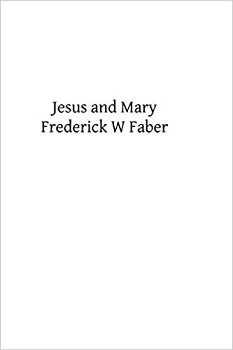
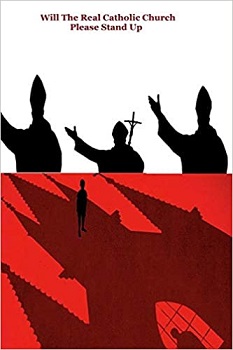










 Follow
Follow


